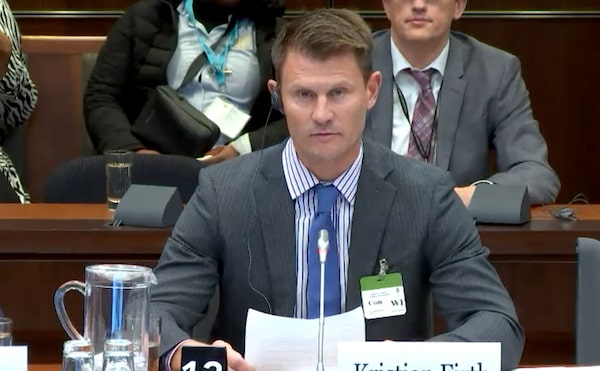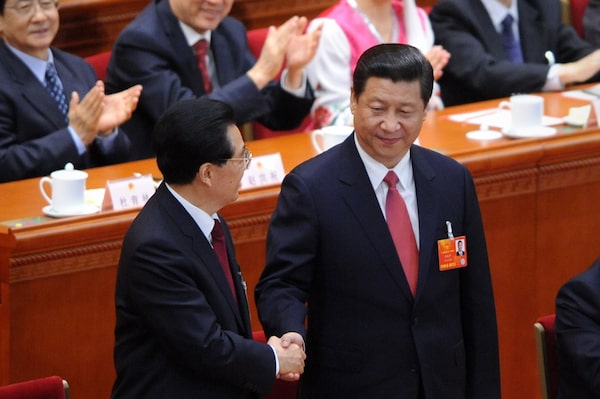Good morning,
The head of two-person IT staffing company GCStrategies said he and his business partner collected $2.5-million in commissions for part-time work on the federal government’s ArriveCan app project, but refused to answer questions about his involvement in a $25-million IT services contract.
Kristian Firth also disputed Auditor-General Karen Hogan’s recent finding that his company received $19.1-million to work on the app project, saying it was closer to $11-million.
Firth’s testimony yesterday at a House of Commons committee was his first public response to last month’s ArriveCan report from Hogan, which found that GCStrategies was directly involved in drafting the terms for the IT services contract, which it ultimately won.
- Campbell Clark: The ArriveCan of worms: public-service problems spill out

GC Strategies' Kristian Firth testifies regarding ArriveCan app at the company’s committee appearance in October, 2022.Handout
This is the daily Morning Update newsletter. If you’re reading this on the web, or it was forwarded to you from someone else, you can sign up for Morning Update and more than 20 other Globe newsletters on our newsletter signup page.
Supreme Court ruling on sexual-assault myths unfairly biased against defendants, lawyers argue
Criminal-defence lawyers in Canada are accusing the Supreme Court of having a double standard in sexual-assault cases after a unanimous ruling that made it more difficult for defendants to appeal.
In recent years, appeal courts in several provinces and territories had accepted that stereotypes and assumptions about accused men should be treated as seriously as the myths about complainants of sexual assault.
But the Supreme Court last week shot it down in a 7-0 ruling, calling it a “false symmetry.” The judges rejected any parallel between the use of myths that undermine the credibility of sexual-assault complainants and the use of improper assumptions affecting the accused.
A total solar eclipse is coming to Canada. Is your heart prepared?
When the sun blacks out on April 8, more Canadians will be able to see it than any eclipse in history. If the weather co-operates, the few minutes during which the sun is totally eclipsed are certain to be dramatic.
At such times, the sky darkens enough to allow bright stars and planets to appear. Off to the side, the perimeter of the moon’s shadow creates a sunset glow on every horizon.
But the real attention-getter is the black circle in the sky rimmed with white, brushlike streamers. This is the million-degree sheath of ionized particles that forms the sun’s corona and is normally hidden by the glaring brightness of the daytime sky.
Got a news tip that you’d like us to look into? E-mail us at tips@globeandmail.com Need to share documents securely? Reach out via SecureDrop
Also on our radar
Canadians’ wealth is bolstered by stock rally: Canadians are riding the recent stock-market rally to bolster their wealth, but they continue to face onerous debt payments that are eating up a large chunk of their take-home pay.
Ireland plans to press Trudeau on UNRWA funding: Ireland’s Tánaiste, the equivalent of its Deputy Prime Minister, says he plans to discuss the need for sustainable funding of UNRWA, the United Nations aid agency in Gaza, when he meets with Prime Minister Justin Trudeau this week.
Plan to install new leaders in Haiti appears to crumble: A proposal to install new leadership in Haiti appeared to be falling apart yesterday as some political parties rejected the plan to create a presidential council that would manage the transition.
- Konrad Yakabuski: Haiti cannot wait another year for the U.S. and Canada to help
Zelensky adviser calls for more aid for Ukraine: Western leaders must continue providing aid to Ukraine in order to prevent Vladimir Putin from gaining permanent leverage over democratic countries, a top adviser to President Volodymyr Zelensky said yesterday. The comments come as the Russian President has ramped up his nuclear rhetoric.
Rwandan court bars opposition candidate: Paul Kagame’s path to the Rwandan presidency became a lot easier after a court barred a high-profile opposition leader from the July election. Kagame is entering his fourth decade of rule in Rwanda.
Morning markets
Stocks bide time ahead of US data triple-whammy
Global shares hovered near record highs on Thursday ahead of a trio of U.S. data releases that has the potential to shift the outlook for interest rates. U.S. consumer inflation data earlier this week showed price pressures heated up more quickly than expected in February. With the next Federal Reserve meeting coming up, investors still expect the bank will still cut rates. The Bank of Japan also meets next week. Tech was looking perky this morning on Apple supplier Foxconn’s upbeat outlook for 2024. The Canadian dollar opened at 74.23 U.S. cents.
What everyone’s talking about
Craig Alexander: “Make no mistake, the Bank of Canada will win the war against inflation, and this is a good thing. … But returning us to low and stable inflation is creating its own set of economic scars, and it is adding to some of Canada’s structural economic challenges of weak business investment, poor productivity and housing affordability problems.”
David Moscrop: “Mr. Ford ought to take a second look at his plan to push students through to skilled trades, both for the sake of the students and the province. While we should, as a society, encourage students to take up trades – and celebrate them when they do – we shouldn’t treat them as mere fodder for the labour market just because governments have failed to properly plan for economic needs. That way lies disaster.”
Today’s editorial cartoon

Editorial cartoon by David Parkins, March 14, 2024.Illustration by David Parkins
Living better
Want a bigger tip? Add an emoji
Few personal finance topics get people fired up as much as tipping. But as staunch as our personal tipping policies might appear, a new study has found the presence of emojis on a bill can increase how much we tip. Yes, a simple happy face emoji can boost tips by over 30 per cent, in some contexts.
Moment in time: March 14, 2013

Newly-elected Chinese President Xi Jinping, right, shakes hands with former president Hu Jintao after the election of the new president of China during the 12th National People's Congress in the Great Hall of the People in Beijing on March 14, 2013.AFP/Getty Images
Chinese President Xi Jinping officially takes power
Four months after he became Communist Party general-secretary, the position from which his true power flows, Xi Jinping ascended to the presidency of the People’s Republic of China on this day in 2013, assuming a position it now appears he may hold for life. From the get-go, Mr. Xi, a relatively unknown figure in the party before his rapid ascension through the ranks in the late 2000s, was ruthless in consolidating power. A sweeping anti-corruption campaign took down many rival cliques, while propaganda organs hailed Mr. Xi as the “people’s leader,” a title reminiscent of Mao Zedong, the late “great leader.” In 2018, China amended its constitution to remove term limits for the presidency, clearing the way for Mr. Xi to begin, last year, an unprecedented third stint in that office. With no obvious successors on the horizon, there is no sign the 70-year-old Mr. Xi is going anywhere anytime soon. James Griffiths
Enjoy today's horoscopes. Solve today's puzzles. Read today's Letters to the Editor.
If you’d like to receive this newsletter by e-mail every weekday morning, go here to sign up. If you have any feedback, send us a note.